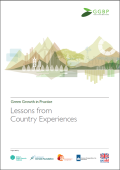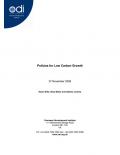
Green growth is becoming an attractive opportunity for countries around the world to achieve poverty reduction, environmental protection, resource efficiency and economic growth in an integrated way. Green growth strategies generate policies and programs that deliver these goals simultaneously. They accelerate investment in resource efficient technologies and new industries, while managing costs and risks to domestic taxpayers, businesses, communities and consumers.
This report carried out by the Green Growth Best Practice (GGBP) initiative, is the first comprehensive international assessment of lessons from experiences of pursuing green growth across all levels of government and all regions. The report is the result of a collaborative partnership between the Climate & Development Knowledge Network (CDKN), the European Climate Foundation (ECF) and the Global Green Growth Institute (GGGI). It engaged 75 authors in evaluating more than 60 programs around the world.
In order to achieve long-term sustainable growth, countries in Sub-Saharan Africa need to adapt their economies and growth models taking 'Green Growth' or 'Green Economy' concepts into account. Only in a scenario, where economic growth and the conservation and sustainable management of natural resources are equally taken into consideration, poverty can be reduced in a sustainable way. On behalf of the German Federal Ministry of Economic Cooperation and Development (BMZ), GIZ supports partner countries in the transition towards a Green Economy, helping them to use upcoming opportunities, manage political risks throughout the transformation process, and tap into new markets and products based on a green economy.
Part of a series of four entitled Urban Patterns for a Green Economy, this guide proposes that cities can act as agents for change that allow their large populations to live less wastefully. It considers how infrastructure systems can be viewed as an opportunity to shift cities onto a more sustainable path by paying close attention to the resources that pass through them, and the manner in which they support the activities of the city. Each city context differs, based on stage of development, pace of growth and available resources.
This report aims at providing the emerging lessons from a representative sample of case studies in 20 developing countries that could help policy makers to address implementation challenges, including overcoming political economy and affordability constraints. The sample has selected on the basis of a number of criteria, including the country's level of development (and consumption), developing country region, energy security and the fuel it subsidies (petroleum fuel, electricity, natural gas).

